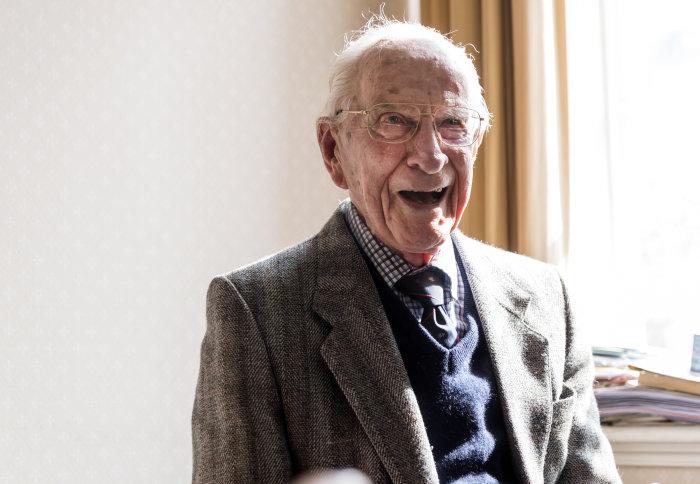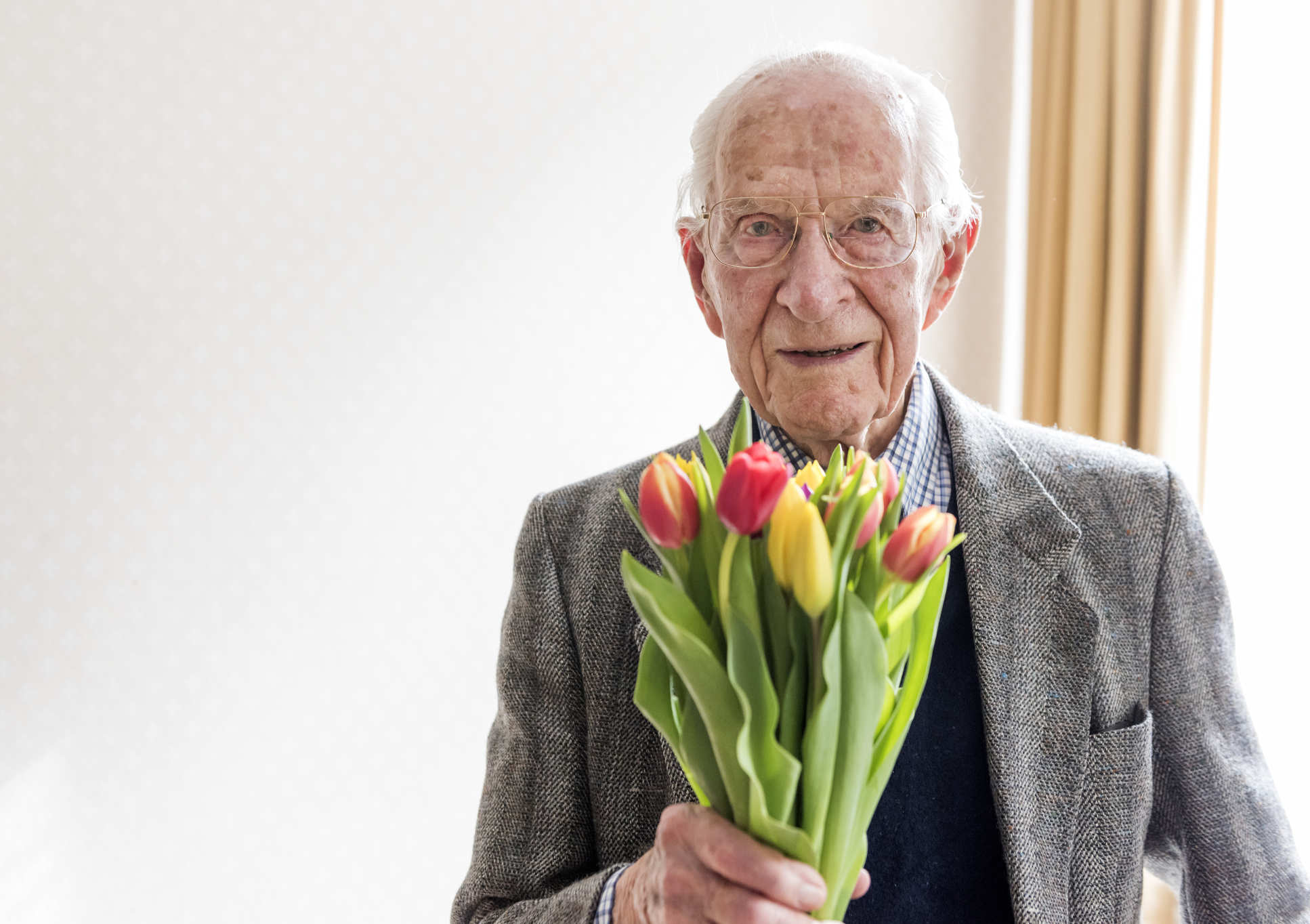Dr Bill Frankland, the grandfather of allergy, celebrates his 108th birthday
by Ellyw Evans

Dr Bill Frankland, acclaimed allergy expert who popularised the pollen count is one of Imperial’s oldest alumni at 108.
A pioneer in the field of allergy, Dr Frankland has helped transform our understanding of allergies during his 70-year long career in medicine, based mostly at St Mary’s Hospital.
Dr Frankland completed his medical studies at The Queen's College, Oxford and St Mary's Hospital Medical School, which later became part of Imperial College London after a merger in 1988.
Speaking from his care home near Barbican, Dr Frankland who turns 108 on 19 March, puts his longevity down to luck:
“I like to think the reason I’ve lived so long is that I’ve got 'guardian angels'! I’ve come close to death so many times – from the 1918 Spanish Flu pandemic, three and a half years spent as a Japanese Prisoner of War, to experiencing anaphylaxis following a tropical insect bite – but somehow I’ve always managed to miss it and that’s why I’m still here.”
From Spanish flu to COVID-19
As a child growing up in the Lake District, Dr Frankland experienced the spread of the Spanish flu – a pandemic which lasted from 1918-1920 after soldiers fighting in World War One returned home and brought the disease with them.
“I remember my uncle from Yorkshire who was a teacher so wasn’t required to join military service caught the virus in 1919 – he died four days later. I recall family members saying, ‘It would be much better if he died fighting for his country’ which was indicative of the time.”
It’s great to see scientists such as those at Imperial, working so quickly to help tackle the pandemic Dr Bill Frankland
Asked on his perspective of COVID-19, Dr Frankland said: “I must confess that I’m not a ‘virus man’ – infection and allergies have always been my research passions. However, I’ve been following the news around COVID-19 and it's worrying; I think there are a lot of challenges ahead. It’s great to see scientists, such as those at Imperial, working so quickly to help tackle the pandemic."
"I’m also in awe of all the clinical and health care staff on the front line. It takes me back to World War II when I was stationed in Singapore with the Royal Army Medical Corps. I was looking after over 100 injured patients – mainly soldiers – at the same time. I saw many cases of encephalitis which didn’t have a treatment at the time, which was challenging.”
Memories of Mary's

Reflecting on his time spent studying and working at St Mary's Hospital, he said: "I have very fond memories of Mary's. When I returned to the UK after WWII was over, I decided I’d become a dermatology consultant. But I soon realised it didn’t interest me. I owe a lot to Dr John Freeman, head of the Allergy Department, who offered me a trial as a part-time doctor. Six weeks later, I was asked to work there full time. I’ve been an allergist ever since!”
Dr Frankland later went on to popularise the pollen count to help clinicians and patients understand what triggers their seasonal allergies. He still enjoys keeping up with the latest academic research in allergy and has even contributed to four academic papers between the ages of 100 and 105.
Working with Fleming
One of Dr Frankland’s greatest memories is working with Sir Alexander Fleming between 1954-55. Fleming discovered the first-ever antibiotic, penicillin in 1928 at St Mary's Hospital. Fleming was by this point a global celebrity, and part of Dr Frankland’s role as clinical assistant was to sift through the bundles of letters received daily.
Dr Frankland was researching asthma at the time: “Fleming supported my research while I worked for him which led to one of my proudest moments. At the time, it was thought that autologous bacterial vaccines – vaccines made from an individual’s own throat bacteria – could treat certain types of so-called infected asthma. I thought it was all ballyhoo, so I went to Fleming and said I wanted to do a double-blind placebo-controlled trial to test their effectiveness. He gave me the go-ahead to do it although it was very expensive due to the high costs involved in producing autologous vaccines.
“The placebo injections gave exactly the same result as the very expensive ones. I was afraid my chief might sack me! After that study was published I was invited to lecture on it all over the world and at the time I was a junior doctor, not a consultant. I’m still very proud of that.”

A smaller birthday celebration this year
Dr Frankland’s birthday would normally involve a gathering of his family and friends but amid the COVID-19 outbreak, the care home has closed its doors to visitors.
“My birthday this year will be quite different. I’ve been given a special request to have two of my children visit for a short while, but they will have to keep at a safe distance. The staff at the care home are doing a fantastic job at keeping us residents safe and I'm so grateful to them.
“I’m pleased I will still receive a card from the Queen and I’m also delighted that my alma mater, Queen’s College Oxford, are flying their flag in my honour!”
Image credit: Dave Guttridge
Dr A W ‘Bill’ Frankland MBE, DM, FRCP
19 March 1912–2 April 2020
Article text (excluding photos or graphics) © Imperial College London.
Photos and graphics subject to third party copyright used with permission or © Imperial College London.
Reporter
Ellyw Evans
Faculty of Medicine Centre